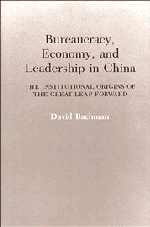Appendix: The constraints on Mao
Published online by Cambridge University Press: 21 March 2010
Summary
This book argues that the actions of Mao Zedong were constrained by the workings of institutions in China. This contradicts much of the conventional wisdom about Mao's power, and some may find my statement that Mao was constrained by the bureaucracy problematic. Let me try to explain clearly what I mean by constraints and give evidence of Mao's being constrained.
The nature of the constraints on Mao
By constraints I mean limitations on personal autonomy. In particular, in this study I mean, first, Mao's range of choice was significantly narrowed and his choices were channeled along a few limited paths. Second, not infrequently, Mao's explicit preferences were not heeded by the bureaucracy. Finally, Mao perceived himself as being denied a leading role in economic affairs owing to the operations of economic institutions. Evidence on all of these points will be presented shortly.
My use of “constraint” thus goes beyond the trite understanding that in the process of information gathering, organizations bias the representation of reality to serve their interests and distort implementation through the effects of standard operating procedures. To be sure, Mao and other Chinese leaders were constrained in this way. But these constraints are so pervasive that it is hard to imagine any leader of a large country in the twentieth century being free of them.
- Type
- Chapter
- Information
- Bureaucracy, Economy, and Leadership in ChinaThe Institutional Origins of the Great Leap Forward, pp. 237 - 240Publisher: Cambridge University PressPrint publication year: 1991



